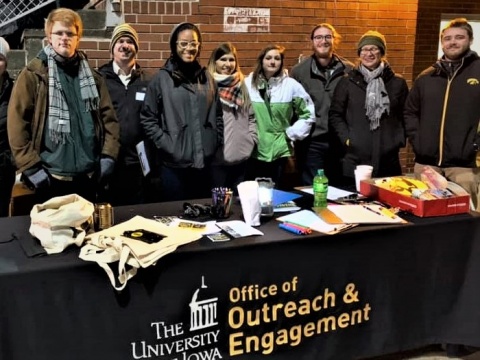Keokuk Downtown Redevelopment Plan
As part of their capstone project, second-year graduate students from the School of Urban & Regional Planning created a redevelopment plan for downtown Keokuk, Iowa.
The main goals of the plan were to create a sustainable redevelopment plan to reuse existing infrastructure, reinvigorate investment in the downtown area, and create community friendly space that is connected to surrounding residential neighborhoods and the riverfront. Currently, there are several large vacant buildings and lots including the River City Mall, former Baymont Inn and Suites, and the YWCA. There are also several strong anchor buildings in this area including the city hall, Hotel Iowa, Grand Theater and South Lee County Courthouse. In the past three years, several buildings and houses that were beyond repair were demolished resulting in city owned vacant lots. The city would like to attract and incentivize commercial and/or residential development on vacant lots. Furthermore, the city has acquired buildings on and around Main Street that are available for redevelopment. There is active reinvestment in the area including the Eagles on Blondeau historic preservation project completed in 2013 and the future Keokuk Public Library Foundation Park.
The plan expands upon the work and goals of the 2018 Keokuk Comprehensive Plan as a means of informing Keokuk city officials of ways in which existing resources can be used to realize the full potential of the Main Street corridor. After an extended period of decline, marked by a sizeable reduction in both population and economic base, this plan aims to set downtown Keokuk on course for a brighter future.
In preparation for that future, the present conditions of the study area needed to be assessed. To this end, a wide range of methods were employed including a Windshield Survey to visually assesses, document, and evaluate readily observable conditions; a Case Study Review to identify communities with demographics similar to Keokuk that have undergone downtown revitalization efforts; a Right-of-Way Improvement Inventory to quantify gaps in the Main Street corridor transportation infrastructure; a Review of Existing Plans to summarize downtown-related goals and recommendations of three previously adopted Keokuk planning documents; a Vacancy Inventory to map vacant parcels and buildings using water records and team member observations; a City-Owned Property Assessment to define the current conditions for 13 developable, city-owned parcels within the study area; and finally, several Public Engagements to gather feedback from residents and city officials for plan content and priority advisement.
The Plan has several areas of focus:
Land Use recommendations assist in streamlining current regulations and developing new laws that can provide additional structure and adherence protocols for both landowners and city administration.
Transportation recommendations provide options for accessibility improvements including active transportation options and installing right-of-way amenities to improve the interconnectedness of the downtown.
Housing recommendations focus on promoting a mix of affordable and market value units within extant buildings in the study area. Options are also provided for policy implementation methods that can help to decrease future, additional vacancies, and the formation of a redevelopment authority is promoted.
Economic Development Through Placemaking recommendations draw on the unique and engaging features within the study area that can facilitate new investment. Options for integrating the Main Street corridor into a more modern economy are also provided.
Catalytic Development Opportunities prompt the usage of city-owned property within the study area to encourage additional investment and community development. Options provided work in conjunction with other progressive projects such as the Keokuk Public Library Foundation Park and a proposed green street treatment by the Keokuk Pathways Plan, another project completed as part of Keokuk’s partnership with the University of Iowa.
